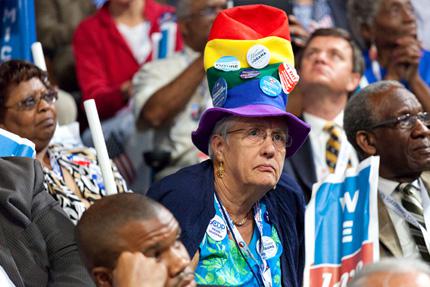Were any of you jarred as much as I was by how frequently Democrats invoked gayness from the podium yesterday? I use that term advisedly, because it wasn’t just speakers mentioning Obama stands for gay marriage and against “don’t ask, don’t tell,” which they did plenty—but speakers treating these policies as signal accomplishments of his term alongside the auto bailout, health care reform, and bin Laden killing.
Michelle notably put gay marriage in a particularly august civil-rights pantheon as part of a crescendo late in her speech:
“If a young preacher could lift us to the mountain top with his righteous dream, and if proud Americans can be who they are and boldly stand at the altar with who they love, then surely, surely, we can give everyone in this country a fair chance at that great American dream.”
And particularly notable given the fear that gripped Democrats over this issue in 2004 and the reticence with which they approached it in 2008, Rahm Emanuel even auditioned marriage as a wedge issue:
“Whose leadership, whose judgment, whose values do you want in the White House when that crisis lands like a thud on the Oval Office desk? … A person who wanted to keep “don’t ask, don’t tell” or a president who believes that who you love should not keep you from serving the country you love?”
Each time a speaker mentioned gay issues, the term of art was no longer the scientific “sexual orientation” but “who you love” or something along those lines. At least as it plays out in Charlotte, N.C. this week, the gay-rights debate is now about marriage and not equal protection or nondiscrimination statutes. It’s no longer about who you are, but what you want to do (in this case, the harmless word “love”). On a stage where identity politics once ruled the day, we’re seeing a shift to what we might call behavioral politics.
Sasha
Read the rest of Slate’s coverage of the Democratic National Convention.
